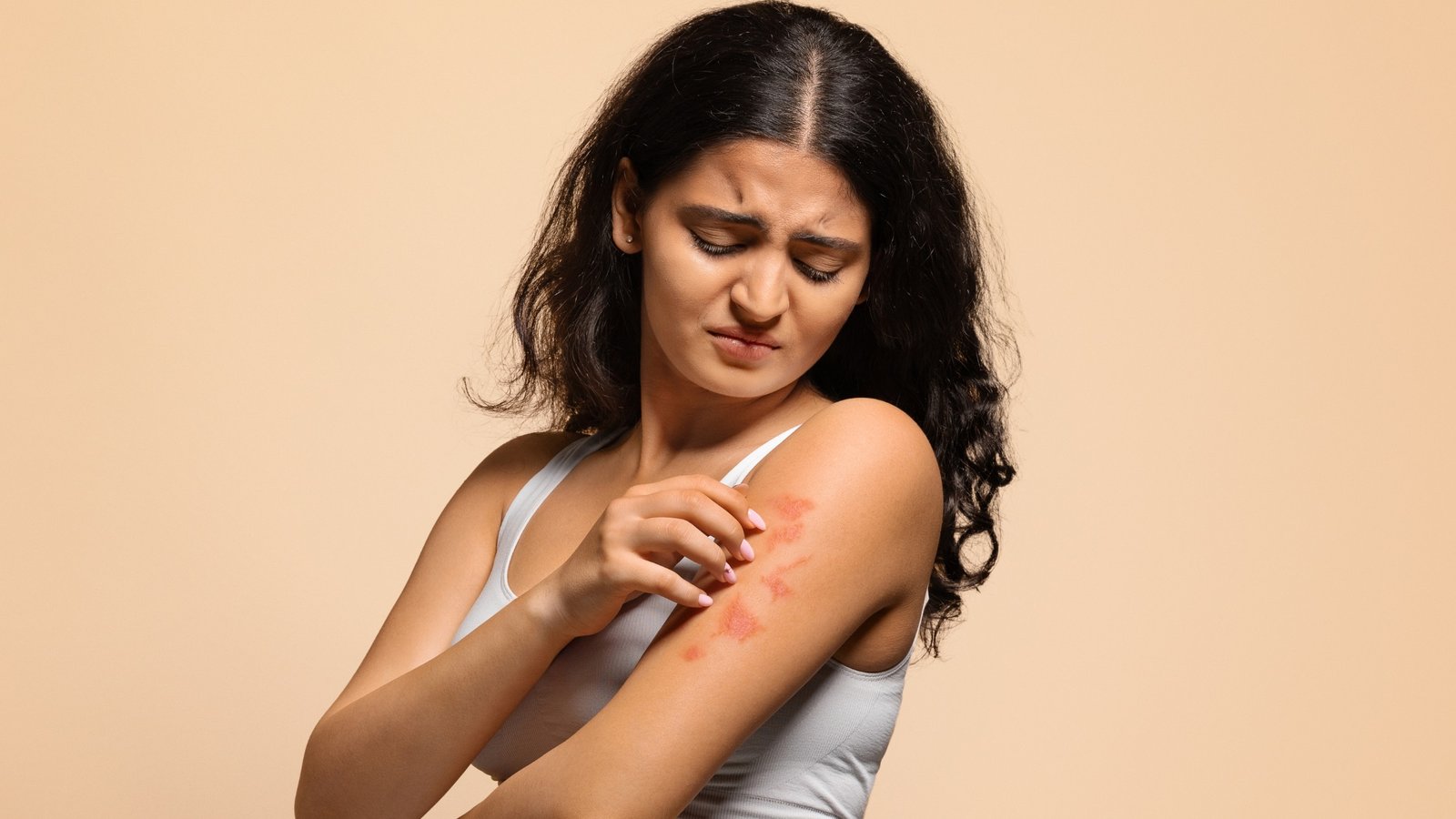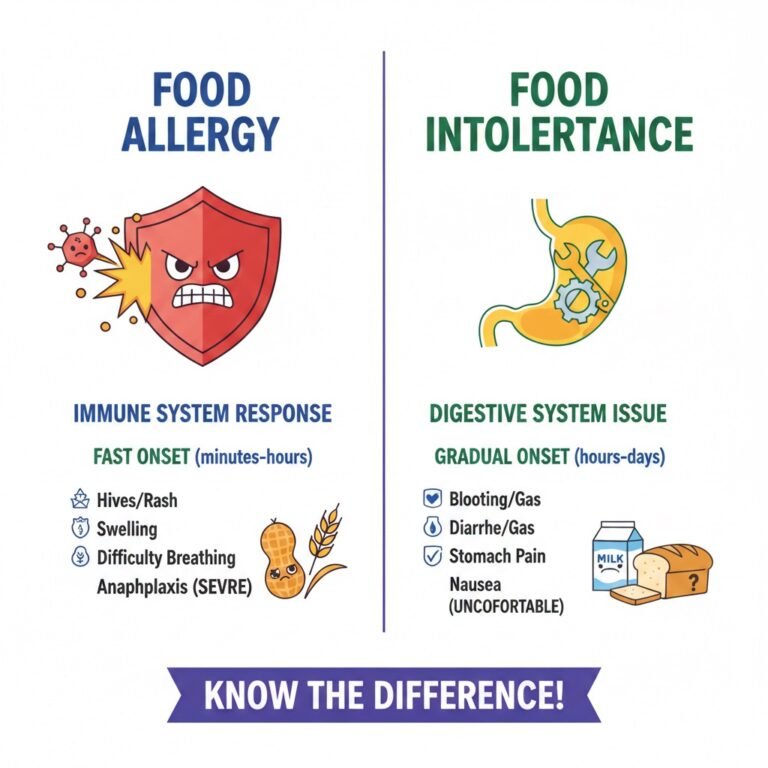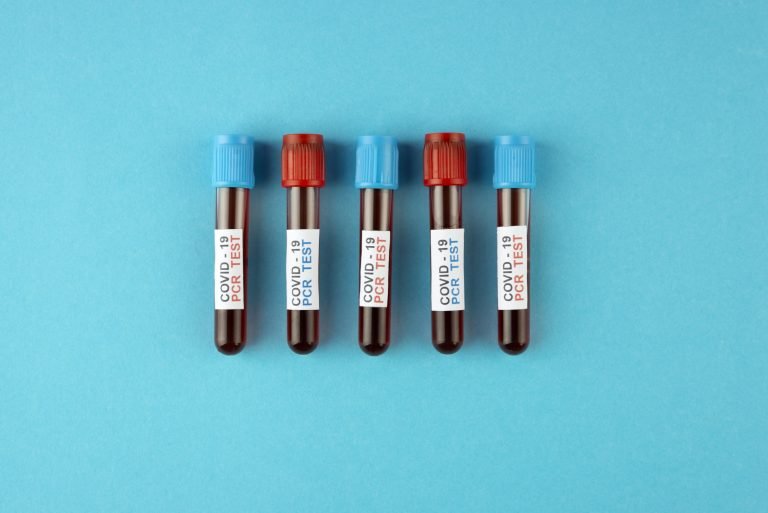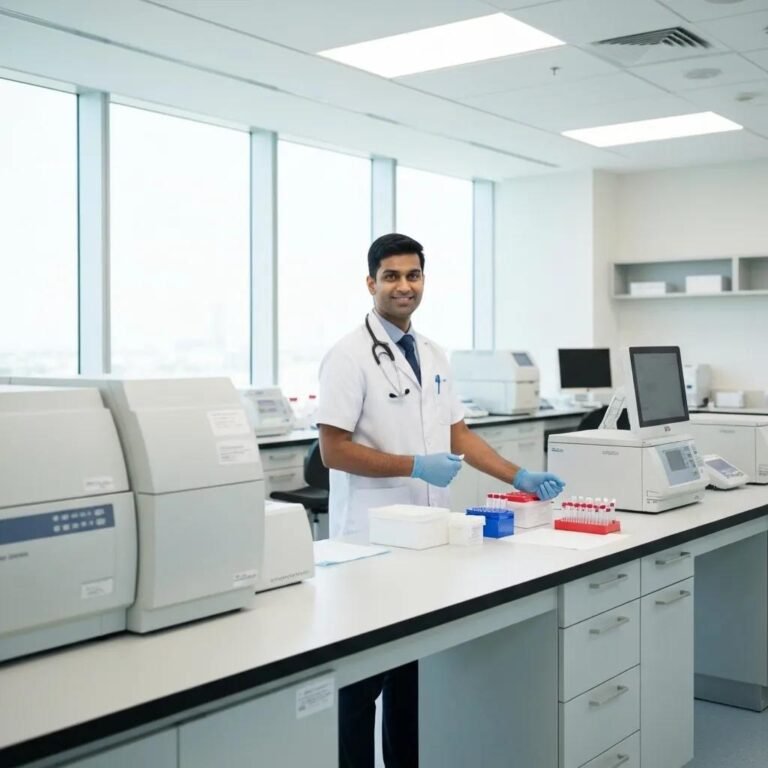What to Expect From Allergy Testing Services in Dubai
What to Expect From Allergy Testing Services in Dubai: Your Complete Guide to Allergy Diagnosis Services
Experiencing chronic sneezing, itching, or hives often signals an immune response gone awry—and allergy diagnosis services in Dubai identify those triggers by measuring skin reactions and IgE antibodies to deliver targeted relief. As a pathologist at LabTestsDubai.com, I will guide you through why testing matters, the methods we use, how to prepare, what happens during testing, understanding your results, cost structures, at-home options, and why our accredited laboratory sets the standard. This comprehensive overview ensures you know exactly what to expect from allergy testing in Dubai, from pinpointing common allergens to arranging your online booking.
Why Should You Get Allergy Testing in Dubai?
Allergy testing involves diagnostic procedures that detect immune sensitization to specific substances using skin prick, blood, and patch methods—ensuring precise trigger identification, reducing unnecessary avoidance, and improving daily well-being. Proper diagnosis prevents recurrent symptoms, guides effective treatment plans, and supports long-term health outcomes by targeting the root cause of allergic reactions rather than masking them. Exploring which symptoms warrant testing clarifies when to take this essential step.
What Are the Common Allergy Symptoms That Indicate Testing?

Below is a list of key signs that warrant professional allergy evaluation in Dubai’s urban and coastal environment.
- Persistent sneezing, nasal congestion, or runny nose in response to seasonal pollen or dust mites.
- Itchy, red, or watery eyes that coincide with exposure to pet dander or mold spores.
- Skin reactions such as hives, eczema flares, or contact dermatitis after touching cosmetics, metals, or latex.
- Gastrointestinal distress—abdominal pain, bloating, or diarrhea—following consumption of common food allergens.
Each symptom points to a possible allergen, leading us to assess how accurate testing can transform your quality of life.
How Does Allergy Testing Improve Your Quality of Life?
Allergy testing improves daily comfort by revealing specific allergens, which enables safe reintroduction of tolerated items and removal of true triggers. Identifying precise allergens allows customization of treatment plans—such as targeted immunotherapy—reducing symptom frequency, medication reliance, and stress associated with uncertain causes. Pinpointing triggers also empowers you to implement avoidance strategies in home and workplace environments, fostering long-term well-being.
What Types of Allergy Tests Are Available in Dubai?
Allergy diagnosis services in Dubai offer several test modalities—skin prick, IgE blood, patch, and molecular methods—that detect immune responses with varying specificity, speed, and scope. Understanding each method’s mechanism and benefit helps you choose the best option for your needs.
How Does the Skin Prick Test Work and What Allergens Does It Detect?
The skin prick test introduces tiny amounts of allergen extracts into the epidermis and monitors localized wheal-and-flare reactions within 15–20 minutes, revealing immediate hypersensitivity to airborne and environmental substances such as pollen, dust mites, and pet dander.
- Pros: Rapid results, broad panel options, minimal discomfort
- Cons: Requires antihistamine wash-out, limited to immediate reactions
This rapid screening sets the foundation for more detailed assessments in complex cases.
Understanding Skin Prick Tests
Skin prick tests are a common method for identifying immediate allergic reactions. These tests involve introducing small amounts of potential allergens to the skin and observing the reaction. The results, typically available within 15–20 minutes, can help pinpoint sensitivities to airborne and environmental allergens.
American Academy of Allergy, Asthma & Immunology, Skin Testing (2024)
This research supports the article’s description of the skin prick test procedure and its role in allergy diagnosis.
What Is the Role of IgE Blood Tests in Allergy Diagnosis?
Specific IgE blood tests measure allergen-binding antibodies in a patient’s serum, offering high sensitivity without requiring cessation of antihistamines or exposure to skin allergens. This method is ideal for patients with extensive eczema, dermatographism, or those at risk of severe anaphylaxis.
- Benefits: No medication interruption, quantitative antibody levels, safe for high-risk patients
- Use Case: Confirming food allergy profiles when skin testing is contraindicated
Blood testing complements skin prick screening by quantifying immune sensitization.
When Is Patch Testing Recommended for Contact Allergies?
Patch testing applies allergen-impregnated chambers to the skin for 48 hours to detect delayed-type hypersensitivity reactions to metals, fragrances, and topical chemicals. After removal, reactions are read at 48 and 72 hours to confirm contact dermatitis triggers.
- Ideal for: Testing for nickel, preservatives, rubber accelerators
- Process: Noninvasive marking → allergen application → reading at 48/72 hours
Pinpointing contact allergens guides safe product selection in personal and occupational settings.
What Are the Benefits of Molecular Allergy Testing for Complex Cases?
Molecular (component-resolved) diagnostics deconstruct allergen extracts into individual proteins, measuring IgE against each component to distinguish cross-reactivity from true sensitization. This precision reduces false positives and refines immunotherapy decisions.
- Mechanism: Protein-level antibody profiling
- Benefit: Improved diagnostic accuracy in multi-allergen or pediatric cases
Molecular testing ensures tailored management when conventional methods yield ambiguous results.
How Should You Prepare for Your Allergy Test in Dubai?
Proper preparation enhances test accuracy by minimizing interference and ensuring a clear reaction profile—factors critical for reliable diagnosis and subsequent treatment planning.
- Avoid antihistamines and certain nasal sprays for 5–7 days before your appointment.
- Keep a symptom diary noting reaction timing, severity, and suspected exposures.
- Bring any existing test reports, a list of current medications, and your referral form if applicable.
Ensuring these steps are complete sets the stage for a smooth testing process.
What Happens During the Allergy Testing Process in Dubai?

Allergy testing progresses through a structured sequence—from consultation and preparation to sample collection and follow-up—designed for patient comfort and diagnostic precision.
- Consultation and Medical History Review
- Skin Prick Test or Patch Test Application
- Blood Draw for IgE Analysis
- Observation Period and Reaction Monitoring
Each step builds on the previous one to provide a comprehensive immune profile and leads naturally into interpreting your personalized results.
How Is the Skin Prick Test Performed?
A small drop of allergen solution is placed on cleaned skin, typically on the forearm or back, and pricked gently through the droplet using a sterile lancet; a positive reaction forms a raised, red wheal within 15–20 minutes, indicating sensitization. This procedure confirms immediate-type allergies and transitions into post-test care instructions.
What to Expect During Blood Sample Collection for Allergy Testing?
A trained phlebotomist draws a small blood sample from the antecubital vein under sterile conditions; the sample is labeled and sent to our accredited lab for IgE antibody quantification, ensuring precise measurement for each tested allergen component.
How Is the Patch Test Applied and Monitored?
Allergen patches are secured to the upper back and left in place for 48 hours; the skin is evaluated at 48 and 72 hours for redness or induration, revealing delayed hypersensitivity. This carefully monitored process informs safe avoidance recommendations.
How Do You Understand Your Allergy Test Results and What Are the Next Steps?
Interpreting results combines quantitative antibody levels and skin reactivity grades to map out a personalized care plan that targets your specific allergens—driving effective treatment and prevention strategies.
How Are Allergy Test Results Interpreted by Specialists?
Laboratory reports categorize IgE levels as low, moderate, or high sensitization and grade skin prick wheals on a 0–4 scale; specialists correlate these findings with clinical history to confirm which allergens are clinically relevant and require action.
Interpreting Allergy Test Results
Allergy test results are interpreted by specialists who correlate IgE levels and skin reactivity to determine clinically relevant allergens. This process helps in creating personalized treatment plans, including avoidance strategies and immunotherapy, to manage allergic reactions effectively.
National Institute of Allergy and Infectious Diseases, Allergy Tests (2023)
This citation reinforces the article’s explanation of how allergy test results are analyzed and used to develop treatment plans.
What Personalized Treatment Plans Are Available After Testing?
Treatment options include allergen avoidance education, prescription of targeted antihistamines or nasal corticosteroids, and immunotherapy protocols—such as sublingual drops or injections—designed to build tolerance over time.
How Can You Implement Allergen Avoidance Strategies Effectively?
Effective avoidance combines environmental controls—like HEPA filtration and dust-mite–proof bedding—with dietary adjustments guided by an allergen-elimination plan. Consistency in avoidance transforms diagnostic clarity into lasting relief.
What Is the Cost of Allergy Testing in Dubai and What Packages Are Offered?
The price of allergy tests in Dubai depends on test type, panel size, and service format, with comprehensive range packages available to suit diverse diagnostic needs and budgets.
Below is a comparison of common allergy test packages:
| Package Name | Allergen Panel | Price (AED) | Why Essential |
|---|---|---|---|
| Basic Respiratory Panel | 20 indoor/outdoor | 449 | Identifies common inhalant triggers |
| Standard Food & Inhalant Mix | 44 allergens | 799 | Broad coverage for mixed symptoms |
| Ultimate Allergy Panel | 295 allergens | 1,499 | In-depth profiling for complex cases |
| Molecular Component Analysis | 50 protein components | 2,999 | Precision in cross-reactivity cases |
These structured options enable you to select the right depth of analysis for your symptoms and budget, leading into at-home testing possibilities.
What Factors Influence the Price of Allergy Tests?
Test complexity, the number of allergens screened, laboratory accreditation, and the inclusion of specialist consultations drive overall cost—ensuring that higher-resolution diagnostics come with commensurate value.
What Are the Typical Allergy Test Packages and Their Allergen Coverage?
Packages range from basic inhalant panels testing 10–20 common allergens to expanded food and environmental mixes covering up to 295 targets, offering incremental diagnostic granularity for personalized care.
How Much Do At-Home Allergy Testing Services Cost in Dubai?
At-home testing services start around AED 899 for standard panels and AED 1,299 for comprehensive profiles, reflecting the convenience of sample collection at your doorstep by DHA-licensed professionals.
How Does At-Home Allergy Testing Work in Dubai and Is It Reliable?
At-home allergy testing delivers the same laboratory-grade results through convenient sample collection by certified experts—combining safety, accuracy, and comfort in your own environment.
What Is the Process for Booking and Conducting At-Home Allergy Tests?
You schedule online or by phone, receive a home-test kit or expert visit, and the DHA-licensed technician collects skin or blood samples, which are then couriered to the lab for analysis under the same quality controls as in-clinic services.
Who Performs At-Home Allergy Tests and What Are Their Qualifications?
Only DHA-certified phlebotomists and nurse practitioners conduct at-home collections, ensuring adherence to sterile techniques, patient comfort protocols, and chain-of-custody standards for sample integrity.
How Accurate Are At-Home Allergy Tests Compared to Clinic Testing?
Reliability matches in-clinic levels—laboratory validation studies confirm concordance rates above 95%—because sample processing and analytic assays remain identical once collected under professional supervision.
Why Choose LabTestsDubai.com for Your Allergy Testing Needs in Dubai?
LabTestsDubai.com combines expert care, comprehensive diagnostics, and seamless booking to deliver unmatched allergy diagnosis services in Dubai, backed by DHA accreditation and a commitment to precision.
What Expert Care and Comprehensive Testing Services Do We Offer?
Our team of immunology and pathology specialists provides full-spectrum testing—from basic panels to molecular diagnostics—supported by detailed result consultations and tailored management plans.
How Does Our Easy Online Booking and Accessibility Benefit You?
With real-time scheduling, at-home service options, and same-day appointments at healthcare districts including Dubai Healthcare City, we eliminate waiting times and streamline your journey to accurate diagnosis.
What Accreditations and Licenses Support Our Trusted Allergy Testing?
LabTestsDubai.com holds DHA licensing for medical laboratories, EIAC recognition, and adheres to ISO 15189 quality standards—ensuring every sample and result meets the highest global benchmarks.
Book Your Allergy Test Today! leveraging our secure platform for fast appointment confirmation and comprehensive support from consultation through to treatment planning.
Frequently Asked Questions About Allergy Testing in Dubai
Below are concise expert answers to the most common patient questions about allergy diagnostics in Dubai.
What Is the Average Turnaround Time for Allergy Test Results in Dubai?
Results for skin prick and IgE blood tests are typically available within 24–48 hours, while patch test readings conclude at 72 hours—after which comprehensive reports and specialist interpretations are provided.
Can Children Safely Undergo Allergy Testing in Dubai?
Yes, pediatric testing protocols use smaller skin prick doses and micro-blood sampling techniques to minimize discomfort while maintaining diagnostic accuracy, with child-friendly facilities and staff.
How Do Food Allergy and Food Intolerance Tests Differ?
Food allergy tests measure IgE-mediated immune reactions that can cause anaphylaxis, whereas intolerance assessments (often IgG-based) indicate non‐immune sensitivities that primarily affect digestion and nutrient absorption.
Are Immunotherapy Treatments Available After Allergy Testing?
Upon confirmed diagnosis, sublingual and subcutaneous immunotherapy options are offered to gradually desensitize you to specific allergens—reducing long-term symptoms and medication use.
How Do I Book an Allergy Test at a Dubai Healthcare City Clinic?
Select “Dubai Healthcare City” from our online booking form or call our hotline to reserve your appointment at one of our partner clinics located within the Dubai Healthcare City district.
Living symptom-free starts with precise diagnosis—our comprehensive allergy testing services in Dubai equip you with the clarity and tools needed for lasting relief.
Schedule your test today and begin the path toward better health with LabTestsDubai.com.






